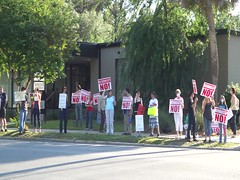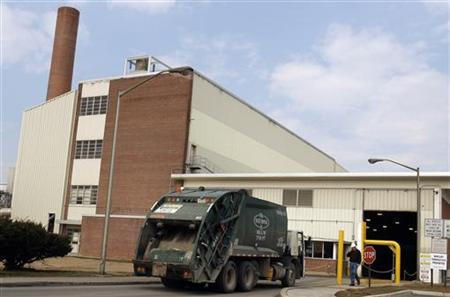Renewable Energy Portfolio Standards (RPS) are being proposed
in Georgia and ALEC is trying to do away with them in North Carolina.
If ALEC doesn’t like them, there must be something good about RPS.
Let’s get on with real renewable energy in Georgia.
 In Georgia,
HB 503,
sponsored by Karla Drenner, Carol Fullerton, Debbie Buckner, Scott
Holcomb, Spencer Frye, and Earnest Smith,
would create a Renewable Energy Credits Trading program as part of
renewable portfolio standards,
as Kyle wrote for Spencer Frye’s blog 10 March 2013,
Let the Sunshine In.
Unfortunately, HB 503 includes biomass as a renewable energy source.
Maybe they just mean landfill gas, which I consider a special case
since it’s being produced anyway, and since methane is worse as
a greenhouse gas than CO2, burning landfill gas makes some sense.
Nope, in
the actual bill, 46-3-71 (1):
In Georgia,
HB 503,
sponsored by Karla Drenner, Carol Fullerton, Debbie Buckner, Scott
Holcomb, Spencer Frye, and Earnest Smith,
would create a Renewable Energy Credits Trading program as part of
renewable portfolio standards,
as Kyle wrote for Spencer Frye’s blog 10 March 2013,
Let the Sunshine In.
Unfortunately, HB 503 includes biomass as a renewable energy source.
Maybe they just mean landfill gas, which I consider a special case
since it’s being produced anyway, and since methane is worse as
a greenhouse gas than CO2, burning landfill gas makes some sense.
Nope, in
the actual bill, 46-3-71 (1):
‘Biomass material’ means organic matter, excluding fossil fuels and black liquor,
including agricultural crops, plants, trees, wood, wood wastes and residues, sawmill
waste, sawdust, wood chips, bark chips, and forest thinning, harvesting, or clearing
residues; wood waste from pallets or other wood demolition debris; peanut shells; cotton
plants; corn stalks; and plant matter, including aquatic plants, grasses, stalks, vegetation,
and residues, including hulls, shells, or cellulose containing fibers
The barn door in there is “harvesting”, which can mean whole trees,
but the rest isn’t much better.
We don’t need to be burning things that increase atmospheric CO2
and end up stripping our forests.
In
North Carolina they staretd with just tops and limbs and then tried to escalate
to whole trees.
We already
fought off the biomass boondoggle here in south Georgia;
let’s not have it encouraged statewide.
Especially when we have better solutions: solar and wind power.
HB 503 isn’t going to get passed this year, since it didn’t make
crossover day, so maybe its sponsors can clean up that biomass mess
before they submit it again.
Speaking of North Carolina,
Continue reading →
 To the VDT the county government always smells like azaleas
and the city of Valdosta government always smells like sewage.
The local newspaper of record doesn’t seem to smell sewage
or landfill problems from Lowndes County.
Today’s VDT editorial complains about
environmental groups paying attention to “theoretical disasters”
(presumably referring to the Sabal Trail pipeline),
yet the VDT has never covered the group that has
most consistently followed the watershed-wide
flooding issues that cause Valdosta’s flooding problems:
WWALS Watershed Coalition.
The VDT recommends citizens get more involved
in sniffing out Valdosta’s sewage problems, yet it doesn’t seem
to cover Citizens Wishing To Be Heard anymore, nor has the VDT called
for the citizen participation sessions promised by
the local governments for the Army Corps of Engineers flooding studies.
Maybe the VDT could encourage citizen participation, rather than ignore it.
To the VDT the county government always smells like azaleas
and the city of Valdosta government always smells like sewage.
The local newspaper of record doesn’t seem to smell sewage
or landfill problems from Lowndes County.
Today’s VDT editorial complains about
environmental groups paying attention to “theoretical disasters”
(presumably referring to the Sabal Trail pipeline),
yet the VDT has never covered the group that has
most consistently followed the watershed-wide
flooding issues that cause Valdosta’s flooding problems:
WWALS Watershed Coalition.
The VDT recommends citizens get more involved
in sniffing out Valdosta’s sewage problems, yet it doesn’t seem
to cover Citizens Wishing To Be Heard anymore, nor has the VDT called
for the citizen participation sessions promised by
the local governments for the Army Corps of Engineers flooding studies.
Maybe the VDT could encourage citizen participation, rather than ignore it.










